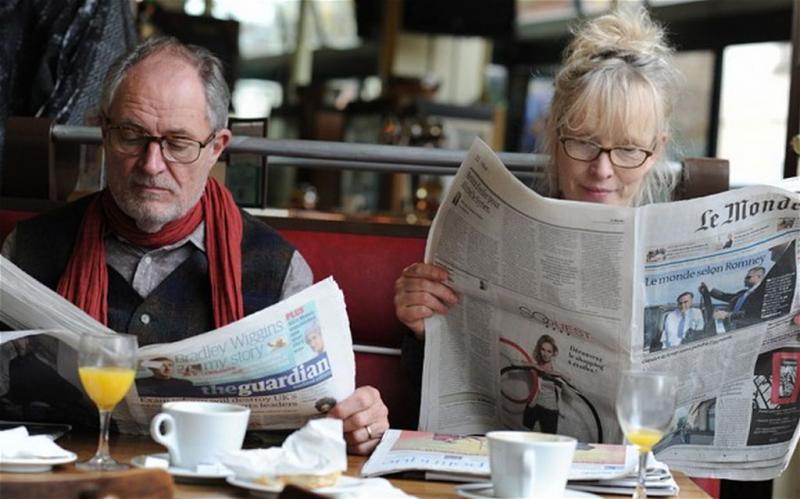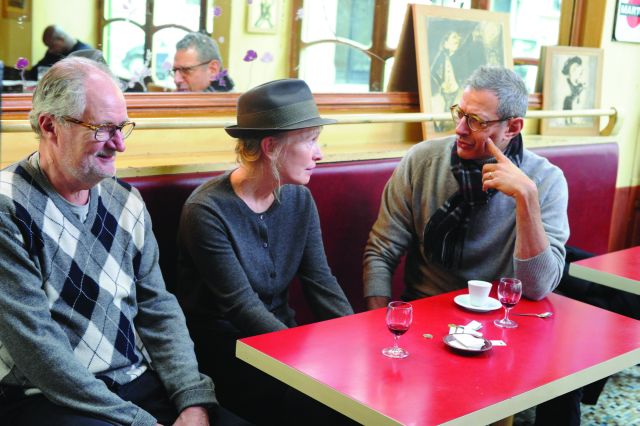Le Week-End | reviews, news & interviews
Le Week-End
Le Week-End
Latest Roger Michell/Hanif Kureishi collaboration is grown-up, touching, and gently Gallic

One of the joys of autumn is the seasonal return to films about - and intended for - grown-ups, and movies don't come much more crisply and buoyantly adult than Le Week-End, at once the latest and best from the director/writer team of Roger Michell and Hanif Kureishi. The abundant wisdom of the pair's third screen collaboration within 10 years surely reflects the growing awareness that comes with age of the derailments, large and small, that lie scattered along life's way.
But whereas one might expect a gathering dourness from this excavation of marital fissures as they are laid bare during a Birmingham couple's anniversary weekend in France, the film benefits from a glancing whimsy that is itself definably Gallic: it's as if the very presence of Paris has put a spring in everyone's step (a condition to which Woody Allen of late would clearly relate), leaving its blissful trio of stars to do the rest. And, zut alors, do they ever.
 Jim Broadbent and Lindsay Duncan (pictured right with the film's third lead, Jeff Goldblum) are expertly matched as a couple who have barely settled into their Eurostar seats before the cracks in their conjugal union are beginning to show. Nick (Broadbent) is financially fretful, sexually unfulfilled, and browbeaten. He is also deeply smitten with Meg (Duncan), his coolly analytical spouse who jokes about being "tri-polar" and accuses her husband of 30 years of chewing his food like an "old horse at a trough". Will these few days away mark time for the pair at whatever cost to a family back home who are intermittently referenced via phone calls and the like?
Jim Broadbent and Lindsay Duncan (pictured right with the film's third lead, Jeff Goldblum) are expertly matched as a couple who have barely settled into their Eurostar seats before the cracks in their conjugal union are beginning to show. Nick (Broadbent) is financially fretful, sexually unfulfilled, and browbeaten. He is also deeply smitten with Meg (Duncan), his coolly analytical spouse who jokes about being "tri-polar" and accuses her husband of 30 years of chewing his food like an "old horse at a trough". Will these few days away mark time for the pair at whatever cost to a family back home who are intermittently referenced via phone calls and the like?
Maybe but just as possibly not, given the intermingling of opposites that for some while, one senses, has kept this marriage on track. "You can't not love and hate the same person," Nick decides, some time before he twice praises Meg as "hot" only to add the words "but cold" immediately after. The film is startlingly alert to the Janus-faced qualities of desire and desperation, and its neatly structured narrative gets a fillip from the introduction of a spry, wry Jeff Goldblum in prime form as Morgan, an old Cambridge pal of Nick's who has effected his own escape to Paris with a much younger, and pregnant, wife.
 Is Morgan living any man's midlife dream? Once again, the film is too smart to answer decisively beyond building to a dinner party (with Goldblum, pictured left) that culminates in a monologue from Nick that looks set to become an acting class staple - though good luck to anyone attempting to better the haunted sense of self that Broadbent brings to every second of a superlative performance. His grasping cry of "don't do that" ranks in power with the "please don't" that accompanies the climax of Tom Stoppard's The Real Thing, as befits a film steeped in a full-blooded awareness of the theatre that is in no way stagey (the central pair are seen visiting Beckett's grave, while Broadbent's work puts one in mind on occasion of a celluloid Vanya.)
Is Morgan living any man's midlife dream? Once again, the film is too smart to answer decisively beyond building to a dinner party (with Goldblum, pictured left) that culminates in a monologue from Nick that looks set to become an acting class staple - though good luck to anyone attempting to better the haunted sense of self that Broadbent brings to every second of a superlative performance. His grasping cry of "don't do that" ranks in power with the "please don't" that accompanies the climax of Tom Stoppard's The Real Thing, as befits a film steeped in a full-blooded awareness of the theatre that is in no way stagey (the central pair are seen visiting Beckett's grave, while Broadbent's work puts one in mind on occasion of a celluloid Vanya.)
Duncan is every bit as remarkable as the comparatively self-contained Meg, a tougher role in that this spoken embodiment of "melting ice" threatens to lob sympathy firmly in Nick's court: to that extent, one can tell that this is a movie made by men. On the other hand, it's difficult not to share Meg's exasperation at Nick's multiple deceptions, and Duncan's silken severity seems just the right complement to Broadbent's open-faced bewilderment mixed with alarm. Some might assume there to be no exit for this couple, to cite a Frenchman who goes unacknowledged here. But as an hommage-laden final scene suggests, lacerations can perhaps give way to levity as well. Here's betting that Nick and Meg trade in their return train ticket for many an aperitif at the Café de Flore.
Overleaf: Watch the trailer for Le Week-End
One of the joys of autumn is the seasonal return to films about - and intended for - grown-ups, and movies don't come much more crisply and buoyantly adult than Le Week-End, at once the latest and best from the director/writer team of Roger Michell and Hanif Kureishi. The abundant wisdom of the pair's third screen collaboration within 10 years surely reflects the growing awareness that comes with age of the derailments, large and small, that lie scattered along life's way.
But whereas one might expect a gathering dourness from this excavation of marital fissures as they are laid bare during a Birmingham couple's anniversary weekend in France, the film benefits from a glancing whimsy that is itself definably Gallic: it's as if the very presence of Paris has put a spring in everyone's step (a condition to which Woody Allen of late would clearly relate), leaving its blissful trio of stars to do the rest. And, zut alors, do they ever.
 Jim Broadbent and Lindsay Duncan (pictured right with the film's third lead, Jeff Goldblum) are expertly matched as a couple who have barely settled into their Eurostar seats before the cracks in their conjugal union are beginning to show. Nick (Broadbent) is financially fretful, sexually unfulfilled, and browbeaten. He is also deeply smitten with Meg (Duncan), his coolly analytical spouse who jokes about being "tri-polar" and accuses her husband of 30 years of chewing his food like an "old horse at a trough". Will these few days away mark time for the pair at whatever cost to a family back home who are intermittently referenced via phone calls and the like?
Jim Broadbent and Lindsay Duncan (pictured right with the film's third lead, Jeff Goldblum) are expertly matched as a couple who have barely settled into their Eurostar seats before the cracks in their conjugal union are beginning to show. Nick (Broadbent) is financially fretful, sexually unfulfilled, and browbeaten. He is also deeply smitten with Meg (Duncan), his coolly analytical spouse who jokes about being "tri-polar" and accuses her husband of 30 years of chewing his food like an "old horse at a trough". Will these few days away mark time for the pair at whatever cost to a family back home who are intermittently referenced via phone calls and the like?
Maybe but just as possibly not, given the intermingling of opposites that for some while, one senses, has kept this marriage on track. "You can't not love and hate the same person," Nick decides, some time before he twice praises Meg as "hot" only to add the words "but cold" immediately after. The film is startlingly alert to the Janus-faced qualities of desire and desperation, and its neatly structured narrative gets a fillip from the introduction of a spry, wry Jeff Goldblum in prime form as Morgan, an old Cambridge pal of Nick's who has effected his own escape to Paris with a much younger, and pregnant, wife.
 Is Morgan living any man's midlife dream? Once again, the film is too smart to answer decisively beyond building to a dinner party (with Goldblum, pictured left) that culminates in a monologue from Nick that looks set to become an acting class staple - though good luck to anyone attempting to better the haunted sense of self that Broadbent brings to every second of a superlative performance. His grasping cry of "don't do that" ranks in power with the "please don't" that accompanies the climax of Tom Stoppard's The Real Thing, as befits a film steeped in a full-blooded awareness of the theatre that is in no way stagey (the central pair are seen visiting Beckett's grave, while Broadbent's work puts one in mind on occasion of a celluloid Vanya.)
Is Morgan living any man's midlife dream? Once again, the film is too smart to answer decisively beyond building to a dinner party (with Goldblum, pictured left) that culminates in a monologue from Nick that looks set to become an acting class staple - though good luck to anyone attempting to better the haunted sense of self that Broadbent brings to every second of a superlative performance. His grasping cry of "don't do that" ranks in power with the "please don't" that accompanies the climax of Tom Stoppard's The Real Thing, as befits a film steeped in a full-blooded awareness of the theatre that is in no way stagey (the central pair are seen visiting Beckett's grave, while Broadbent's work puts one in mind on occasion of a celluloid Vanya.)
Duncan is every bit as remarkable as the comparatively self-contained Meg, a tougher role in that this spoken embodiment of "melting ice" threatens to lob sympathy firmly in Nick's court: to that extent, one can tell that this is a movie made by men. On the other hand, it's difficult not to share Meg's exasperation at Nick's multiple deceptions, and Duncan's silken severity seems just the right complement to Broadbent's open-faced bewilderment mixed with alarm. Some might assume there to be no exit for this couple, to cite a Frenchman who goes unacknowledged here. But as an hommage-laden final scene suggests, lacerations can perhaps give way to levity as well. Here's betting that Nick and Meg trade in their return train ticket for many an aperitif at the Café de Flore.
Overleaf: Watch the trailer for Le Week-End
The future of Arts Journalism
You can stop theartsdesk.com closing!
We urgently need financing to survive. Our fundraising drive has thus far raised £49,000 but we need to reach £100,000 or we will be forced to close. Please contribute here: https://gofund.me/c3f6033d
And if you can forward this information to anyone who might assist, we’d be grateful.

Subscribe to theartsdesk.com
Thank you for continuing to read our work on theartsdesk.com. For unlimited access to every article in its entirety, including our archive of more than 15,000 pieces, we're asking for £5 per month or £40 per year. We feel it's a very good deal, and hope you do too.
To take a subscription now simply click here.
And if you're looking for that extra gift for a friend or family member, why not treat them to a theartsdesk.com gift subscription?
more Film
 The Courageous review - Ophélia Kolb excels as a single mother on the edge
Jasmin Gordon's directorial debut features strong performances but leaves too much unexplained
The Courageous review - Ophélia Kolb excels as a single mother on the edge
Jasmin Gordon's directorial debut features strong performances but leaves too much unexplained
 Blu-ray: The Graduate
Post #MeToo, can Mike Nichols' second feature still lay claim to Classic Film status?
Blu-ray: The Graduate
Post #MeToo, can Mike Nichols' second feature still lay claim to Classic Film status?
 Little Trouble Girls review - masterful debut breathes new life into a girl's sexual awakening
Urska Dukic's study of a confused Catholic teenager is exquisitely realised
Little Trouble Girls review - masterful debut breathes new life into a girl's sexual awakening
Urska Dukic's study of a confused Catholic teenager is exquisitely realised
 Young Mothers review - the Dardennes explore teenage motherhood in compelling drama
Life after birth: five young mothers in Liège struggle to provide for their babies
Young Mothers review - the Dardennes explore teenage motherhood in compelling drama
Life after birth: five young mothers in Liège struggle to provide for their babies
 Blu-ray: Finis Terrae
Bleak but compelling semi-documentary, filmed on location in Brittany
Blu-ray: Finis Terrae
Bleak but compelling semi-documentary, filmed on location in Brittany
 Oslo Stories Trilogy: Sex review - sexual identity slips, hurts and heals
A quietly visionary series concludes with two chimney sweeps' awkward sexual liberation
Oslo Stories Trilogy: Sex review - sexual identity slips, hurts and heals
A quietly visionary series concludes with two chimney sweeps' awkward sexual liberation
 Sorry, Baby review - the healing power of friendship in the aftermath of sexual assault
Eva Victor writes, directs and stars in their endearing debut feature
Sorry, Baby review - the healing power of friendship in the aftermath of sexual assault
Eva Victor writes, directs and stars in their endearing debut feature
 Blu-ray: Who Wants to Kill Jessie?
Fast-paced and visually inventive Czech comedy
Blu-ray: Who Wants to Kill Jessie?
Fast-paced and visually inventive Czech comedy
 Oslo Stories Trilogy: Love review - freed love
Gay cruising offers straight female lessons in a heady ode to urban connection
Oslo Stories Trilogy: Love review - freed love
Gay cruising offers straight female lessons in a heady ode to urban connection
 Beating Hearts review - kiss kiss, slam slam
Romance and clobberings in a so-so French melodrama
Beating Hearts review - kiss kiss, slam slam
Romance and clobberings in a so-so French melodrama
 Materialists review - a misfiring romcom or an undercooked satire?
Writer-director Celine Song's latest can't decide what kind of film it is
Materialists review - a misfiring romcom or an undercooked satire?
Writer-director Celine Song's latest can't decide what kind of film it is

Add comment